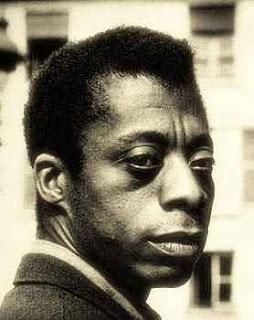 |
| James Baldwin/nlcphs.org |
JAMES BALDWIN -- REFLECTIONS OF A MAVERICK
Date:Byline:
The hair is almost white now, but that is the only indication that James Baldwin will be 60 years old in August.
Thirty-one years have passed since the publication of his first book, the novel ''Go Tell It on the Mountain,'' and 21 years since ''The Fire Next Time'' made him an international celebrity.
The intensity and passion that characterize his writing are evident in conversation. His voice, though soft, is deep and resonant, and in its modulations and rhythms one hears echoes of the boy preacher he once was.
He gestures with a fluidity reminiscent of a conductor, as if there is an unseen orchestra that must be brought into harmony. The face he has written of as ugly, with its protuberant eyes, flat nose and wide mouth, has, in reality, the ritual beauty of a Benin head. Baldwin looks as if he were sculpted in flesh rather than merely being born of it.
The following is the edited transcript of a three- hour conversation taped in my home in Amherst, Mass., on a Sunday afternoon in April. As writers, 15 years apart in age, we wanted to compare our generations. As it turned out, we embodied our generations more than I, at least, had anticipated. I began by saying to Baldwin:
Your literary beginnings were as a part of the New York intelligentsia. It was right after the end of World War II that you began publishing reviews and essays in publications like The New Leader, The Nation, Commentary and Partisan Review. What was it like for a young black man, 21 years old, to be around people like Randall Jarrell, Dwight Macdonald, Lionel Trilling, Delmore Schwartz, Irving Howe and William Barrett, to name a few.
For me, these people were kind of on Olympus. I mean, in one way I was very intimidated by them, and I don't know what in the world they thought of me. Dwight Macdonald told me that I was ''terribly smart.'' (Laughs) I certainly learned from them, though I could not tell you exactly what I learned. A certain confidence in myself, perhaps.
Did you ever approach Langston Hughes? He was living in Harlem.
I knew of Langston Hughes, but it never occurred to me. I was too shy. Later on I realized that I could have. He didn't live far away, but it wouldn't have occurred to me. You see, there were two Harlems. There were those who lived on Sugar Hill and there was the Hollow, where we lived. There was a great divide between the black people on the Hill and us. I was just a ragged, funky black shoeshine boy and was afraid of the people on the Hill, who, for their part, didn't want to have anything to do with me. Langston, in fact, did not live on the Hill, but in my mind, he was associated with those people. So I would never have dreamed of going and knocking on his door.
(click here to read the full text of this slice of literary history on the NY Times website)

No comments:
Post a Comment